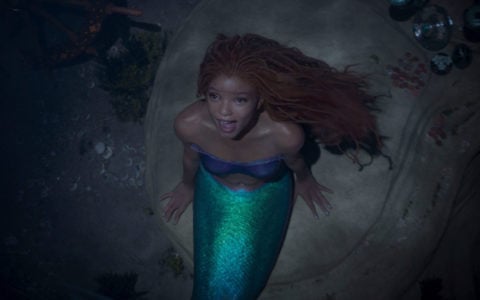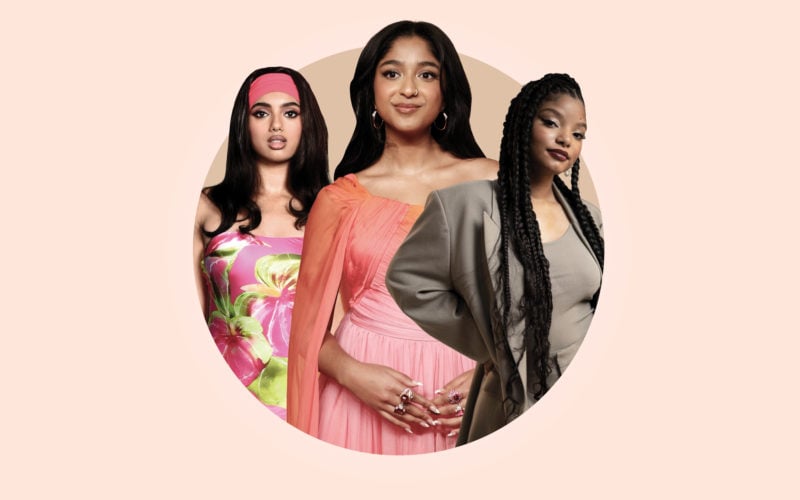The Avantika Rapunzel Backlash Is Part of a Toxic Trend for POC Actors
‘Mean Girls’ star Avantika Vandanapu is the latest POC celeb to face racist reactions in response to casting news. And it has to stop.
Another day, another round of racist trolls taking over the internet. And this time, it’s all because of an animated Disney princess. Earlier this week, social media went into a tizzy when unsubstantiated rumours swirled that Mean Girls actress Avantika Vandanapu was doing screen tests for a live-action Tangled movie, based on the story of Rapunzel. The internet immediately did what it does best: Make thirsty fancams, with several TikTok users casting their dream Rapunzel and Flynn Rider. Just as swift? Backlash to Vandanapu’s rumoured casting.
@editsfxi petition for avantika and milo to be our rapunzel and flynn 🫡 #avantika #milomanheim #tangled #rapunzel #flynnrider #edit #disney #fyp ♬ original sound – lola
The same aforementioned fancams turned into something more akin to hate-cams, as users detailed the reasons they feel Avantika Vandanapu shouldn’t be the next Rapunzel. And it’s not because she doesn’t have the acting chops or a face card that never declines (because, let’s be real, she has both), but purely due to the fact that Vandanapu is South Asian, and Rapunzel — whom we’ll remind you is an *entirely fictional, animated character* — is meant to be played by a white, blonde actress. Excuse us while we roll our eyes.
This kind of backlash isn’t new
Vandanapu is far from the first POC actor to face reactions like this to casting news. In July 2021, Canadian Never Have I Ever star Maitreyi Ramakrishnan, was the target of negativity when she shared her dream of playing the iconic character in an interview with CBS News. “I think Rapunzel should be a South Asian girl,” Ramakrishnan told the pub. “Because hear me out, no one knows what it feels like to be trapped in your room, not able to go out because your mother is telling you no without giving you an actual proper reason like brown girls do.”
Despite the fact that casting a South Asian actress to play a character like Rapunzel would, in fact, be a stroke of genius (the luscious tresses alone are reason enough!), many people seem to take issue with it. In response to online commentary around Avantika Vandanapu, Ramakrishnan shared her annoyance with the trolls on social media, tweeting: “And to the racists, y’all still need a hobby fr.”
and they finally woke up to realize it was all just rumours and the sources never existed. good job! and to the racists, y’all still need a hobby fr🤡
— Maitreyi Ramakrishnan (@ramakrishnannn) April 9, 2024
Before Ramakrishnan and Vandanapu, Star Wars actress Kelly Marie Tran also faced racist criticism when she was cast as Rose Tico in 2017’s Star Wars: The Last Jedi. Tran was the first Asian-American to land a lead role in the sci-fi franchise, something people online seemed to take issue with. The racist and sexist vitriol was so bad that Tran removed herself from social media, went to therapy and took a step back from her burgeoning career.
“I left. I said no to a lot of things,” Tran told The Hollywood Reporter in 2021. “It felt like I was just hearing the voice of my agents and my publicity team and all of these people telling me what to say and what to do and how to feel. And I realized, I didn’t know how I felt anymore. And I didn’t remember why I was in this in the first place.”

Then there’s Halle Bailey, who was met with hate when she was cast as Ariel in Disney’s live-action remake of The Little Mermaid. From the moment her role was announced in July 2019, the internet had thoughts about a Black mermaid-princess, and the hashtag #NotMyAriel was born. When the film was released in May 2023, trolls took to the internet in droves to review-bomb the movie, flooding review sites with negativity to skew the average rating.
…It also creeps up across industries
This hate isn’t exclusive to the big screen. In early April, British actress Francesca Amewudah-Rivers faced an onslaught of racism when it was announced she’ll star opposite Tom Holland in the West End adaptation of Romeo & Juliet. The newcomer, who’s making her stage debut as one half of the star-crossed lovers, is a Black woman. So, you get the theme. In a statement to X (formerly Twitter), the production company admonished the racism, stating: “Following the announcement of our Romeo & Juliet cast, there has been a barrage of deplorable racial abuse online directed towards a member of our company. This must stop. We are working with a remarkable group of artists. We insist that they are free to create work without facing online harassment.” (Interestingly, Amewudah-River’s co-star Holland has yet to speak out against the racism).
Representation matters
At the core of these racist reactions is the notion that women of colour aren’t “allowed” to play certain roles because of their skin colour. And that’s simply BS, especially considering that excluding POC actresses from these roles (and many other kinds) has historically been the status quo.
Over the last decade we’ve seen a shift, with the number of lead actresses of colour in feature films steadily growing, which makes any criticism of their incremental wins feel like a knee-jerk response to a shifting norm that no longer centres whiteness. (It should be noted that in 2023, there was a downturn in this representation, according to the most recent USC Annenberg Inclusion Initiative report, with only 14 women of colour leading the top 100 box office movies of the year, down from 18 in 2022.)
The truth is that having actresses of colour cast as traditionally white characters is important. For many young people of colour, seeing folks that look like them portraying the iconic characters they grew up loving reinforces the notion that they belong — both on screen and in society.
As Bailey told Variety in August 2022, “I want the little girl in me and the little girls just like me who are watching to know that they’re special, and that they should be a princess in every single way. There’s no reason that they shouldn’t be.”
Not to mention, having actresses of colour in these roles adds layers of nuance and complexity that we might not get if we strictly stuck to the original source material. Take, for instance, Jenny Han’s The Summer I Turned Pretty book series, which was adapted for TV in 2022. While Han’s heroine Belly Conklin is originally a white teen in the books, she’s played by actress Lola Tung in the show. Casting a woman of Chinese and Swedish descent doesn’t change the specifics of the plot: There’s still a love story, a steamy romantic triangle and lots of growth to be had, but now viewers are also able to understand the dynamics of growing up as a mixed kid between two cultures, like Belly does. This doesn’t take away from the appeal of the character; it adds to it.
It also works at the box office
The fact remains that not only can actresses of colour play these characters with wit, charm, grace and whatever else may be required to bring their characters to life, but they can also be successful while doing it. Despite the racism Bailey faced as Ariel, and the review-bomb attacks lobbed at it, The Little Mermaid was a record-breaking success. When the movie was released to Disney+ for streaming in September 2023, it quickly became one of the most viewed Disney movie premieres ever.
And even though the reductive pushback is disheartening, these actresses aren’t going to fade into the background. After taking a break from the industry, Tran returned with a role in Raya and the Last Dragon. Bailey recently stared in The Colour Purple. Amewudah-Rivers’s Romeo & Juliet sold out its West End run in two hours, and will reportedly move to Broadway in August. As for Vandanapu and Ramakrishnan? They’re just going to keep achieving their dreams. Ramakrishnan put it simply in her tweet: “[Rapunzel’s] still my dream role, been saying that since 2021. No one’s gonna stop me from literally just TRYING to achieve my dreams.”
also lol she’s still my dream role, been saying that since 2021. no one’s gonna stop me from literally just TRYING to achieve my dreams. def not racists who are internet historians hahahaha
— Maitreyi Ramakrishnan (@ramakrishnannn) April 9, 2024
We can get on board with that.







